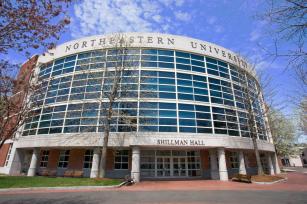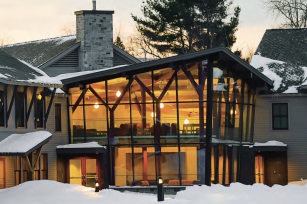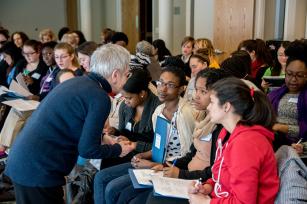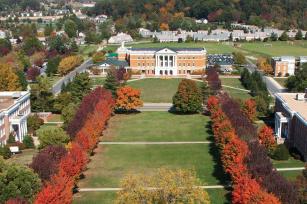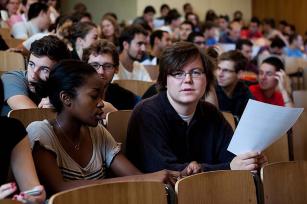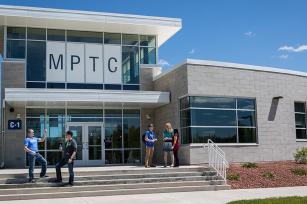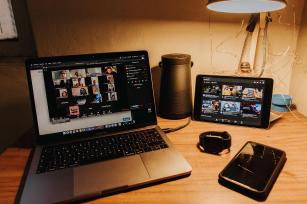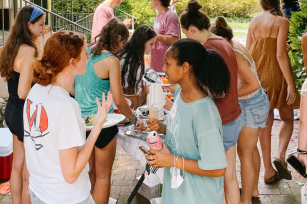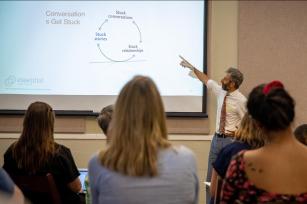
Breadcrumb
- Essential Partners
- Our Stories
- Impact Stories
- Fostering Campus Resilience with the University of Scranton
Fostering Campus Resilience with the University of Scranton

Following the 2016 elections, a coalition of campus leaders from across Lackawanna County, located in Northeast Pennsylvania, came together to take the temperature of their campuses and the broader community. How were the national divisiveness and harmful dynamics playing out locally?
One of the leaders was Julie Schumacher Cohen, Assistant Vice President for Community Engagement and Government Affairs for the University of Scranton, a Catholic Jesuit University in the county. Using Essential Partners’ Guide to Conversations Across the Red-Blue Divide, Cohen and higher education colleagues embarked on a pilot dialogue project with students from several different colleges and universities.
The conversations sparked deeper engagement across the partisan divide, but participants and facilitators alike felt the potential for more depth, more connection, more understanding.
“The faculty were very interested in the potential of dialogue,” said Cohen, “but they had a particular challenge: ‘I’m a teacher, but this is a different set of skills; I don’t generally facilitate dialogue,’ they shared. We knew we needed a hands-on training and we also wanted to be able to more intentionally incorporate the University’s Jesuit tradition.”
It was clear there was more need for carefully designed campus discussions to grapple with the significance of the issues and deeper questions about values and identities, and not simply retreat to groups with the same views, the same concerns, but greater skills and capacity were critical.
That’s when they called Essential Partners.
Proactive Steps to Build Capacity
“We were acting proactively,” she said. “We felt that there could be explosive incidents, because people just weren’t discussing politics constructively. Instead of waiting, we wanted to build our own capacity to talk meaningfully as a campus community.”
The University of Scranton hired Essential Partners to lead faculty and staff training, with a special focus on the synergy between Ignatian Spirituality and EP’s approach.
“The Jesuit tradition,” explained Cohen, “rooted in discernment, reflection, justice and reconciliation—encourages us to choose to engage in dialogue with conviction and humility.”
With ongoing consultation from EP practitioners, there have since been a series of student dialogues leveraging Jesuit spiritual-reflective practices, covering topics such as political and social values, the role of guns, immigration and refugees, the NFL national anthem protests, as well as free speech and political correctness.
Enis Murtaj ’20, one of the student dialogue participants, reflected on the power of dialogue to transform the underlying dynamics. “These dialogues offer students an opportunity to explore new ideas and share their own ideas with an emphasis on listening. Given today’s political polarization, it is crucial for people with opposing views to hear each other out and work together for the betterment of our society.”
The dialogue organizers take care in the topics they choose, the questions they ask, and how the groups are constructed—with diverse political affiliations and backgrounds.
Jessica Nolan, Professor of Psychology and dialogue initiative leader, says that EP’s dialogue structure fosters inclusion in diverse groups. “Research on prejudice reduction shows that in order for contact to effectively reduce prejudice the groups must have equal status, at least within the context of the contact. By providing each participant with the same amount of ‘air time’ the structured nature of the dialogue effectively communicates that everyone's opinion is equally valued.”
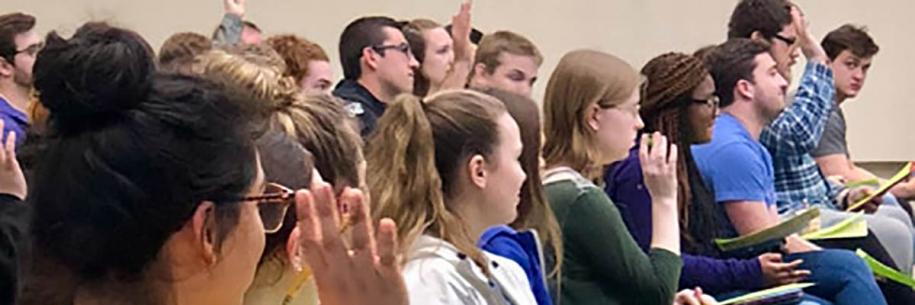
"Facilitated dialogue creates a classroom atmosphere in which exploring uncomfortable issues and asking difficult questions is an expected part of the process, and it allows students space to engage each other without fear of the vitriol common in our public discourse."
Teresa Grettano, Associate Professor and Director of the First-Year Writing program
University of Scranton
Ripple Effects: Community Dialogues, Jesuit Network
The ripple effects of a campus training have reached the classes taught, the larger Scranton community, as well as broader network of Jesuit colleges and universities.
University of Scranton faculty members have incorporated EP’s approach into their classrooms and syllabi. One course on political dialogue, co-taught by one writing and one theology faculty, teaches EP’s approach to undergraduate students, along with story-exchange and other methods to provide students with an experiential learning experience.
"Students long to discuss important political issues,” says Teresa Grettano, Associate Professor and Director of the First-Year Writing program and dialogue initiative leader. “But frequently they lack models for how to do so in ways that reflect their values, relationships, and goals. Facilitated dialogue creates a classroom atmosphere in which exploring uncomfortable issues and asking difficult questions is an expected part of the process, and it allows students space to engage each other without fear of the vitriol common in our public discourse."
University staff, students, and faculty also coordinated a series of dialogues on race and justice with high school students in the Scranton area. “You would not believe the depth and nuance of these conversations,” Cohen reported.
In spring 2019, they led dialogues among university students and local residents through the support of the American Library Association’s “American Creed” documentary project. In fall 2019, they convened “Faith and Politics – A Conversation” with faith groups, higher education partners and the support of Lackawanna County’s Department of Arts and Culture.
Inspired by the impact of Essential Partners’ approach, Cohen has begun working on an Ignatian Guide to Political Dialogue and has shared insights from Scranton’s initiative in the Jesuit America magazine. EP’s training and resources will serve as key resources for the document, which she hopes to publish in time for the 2020 Justice Conference, a meeting of Jesuit higher education faculty and staff that will be held at Georgetown University where Cohen, Nolan, and Grettano will present on Scranton’s dialogue initiative.
Related Impact Stories
Testimonials

Dr. Brooke Vuckovic, Clinical Professor of Leadership“The Dialogic Classroom is by far and away the most skillful and thoughtful professional development I have had in years as an educator.”
Kellogg School of Management

Undergraduate StudentI started to trust everyone in the class—I felt heard and I felt that people wanted to listen. As a result, I wasn’t afraid to let my past come out and let people learn from what I have been through.
Bridgewater College, Virginia

Anne Hopkins Gross, Dean of StudentsThe Essential Partners workshop was a way of building up our ability to talk about more difficult issues, such as poverty and GLBTQ safe spaces. It was really the foundational entrée into those more challenging issues of race, ethnicity, sexuality, and gender. People walked away feeling much more confident about having difficult conversations.
Southern Vermont College, VT

Megan DeFranzaThere is a need not only for safe space within our churches but for our church leaders who often feel alone, or who may feel their job could be at risk if they engage in controversial conversations. How are they to make safe spaces in their own congregations for healthy dialogue if they rarely experience safe space to do the same?
Gordon College, Massachusetts

Dr. Jill DeTemple, Religious Studies FacultyAfter using this approach in my classroom, I am now more willing, and more able, to engage students in meaningful conversations about potentially contentious issues. Whereas I used to nod toward things like homosexuality in religious life, interfaith marriage, or the role of government in reproduction, now I build these conversations into the class so students can learn to speak about their experiences, and so they learn to listen and learn from those with whom they might disagree.
Southern Methodist University, Texas

Program ParticipantI did not anticipate having as many concrete takeaways as I do. I feel there is an immense practical application.

Undergraduate StudentAs a pharmacy major, I do not receive much training on how to handle difficult or controversial conversations. I think that this training will help me not only in my duties as a resident assistant, but in discussing medications and therapies with future patients when the conversation becomes difficult.
Northeastern University, MA

Janet Lansberry, Weissman Center Assistant DirectorThis was probably the most profound workshop that we ever brought to campus. It offered a really unique foundation in personal insight.
Mount Holyoke College, MA

Teresa Grettano, Associate Professor and Director of the First-Year Writing programFacilitated dialogue creates a classroom atmosphere in which exploring uncomfortable issues and asking difficult questions is an expected part of the process, and it allows students space to engage each other without fear of the vitriol common in our public discourse.
University of Scranton (PA)

Megan DeFranzaHere safe space was created for pastors and church leaders to wrestle with topics like evolution which are all too often “off limits” or believed to be antagonistic to the faith.
Gordon College, Massachusetts

Undergraduate StudentI feel more comfortable participating in class and less defensive when other students disagree. And because I learned more from my fellow students about their views, I now feel less competitive with them than in other classes.
Bridgewater College, Virginia

Undergraduate StudentThe most significant thing for me was learning how to ask for more information rather than trying to persuade a person to think differently. I also learned helpful dialogue tips, which are more effective during difficult conversations. If I encounter a difficult dialogue with any of my residents, I plan on using the techniques I learned in this workshop to facilitate those talks.
Northeastern University, MA

Nicki Glasser, Policy CoordinatorWhat surprised me was how much you could transform a relationship during a three-hour conversation.
Transformation Center, Massachusetts

Lauren Barthold, Philosophy FacultyI’ve learned that it is not enough to announce my commitment to dialogue and expect students to know what I mean; I need concrete exercises to allow students to learn how to do it.
Endicott College, Massachusetts

Bob Bordone, Expert and AuthorEssential Partners does the best work in the field of dialogue and communication.
Harvard Negotiation & Mediation Clinical Program, Co-Founder

Beth MendozaDialogue gets more results. It makes decision-making easier. It makes creating participation easier … our greatest organizational impact has been more contributions as well as more effective and efficient meetings.
Moraine Park Technical College, Wisconsin

Anjali Bal, Associate Professor of MarketingWe talked about where we are in the world right now, so we talked quite a bit about polarization. Essential Partners showed how these conversations are becoming more taxing and challenging because of that polarization. These were some first steps in terms of how we can start to have those conversations.
Babson College, MA

Karen Ramirez, Director of the CU Engage ProgramWe get more requests [for campus dialogue] than we could ever respond to.… I’m proud that our work on campus is actually kind of unusual, because it doesn’t support just one population. It supports everyone—students, staff, faculty, graduate students. I don’t know if there are other University of Colorado projects going on that hit all of our campus population.
University of Colorado, Boulder

James Rucker, Faculty MemberIt is really different than it was before. The Essential Partners process has given me the power to be heard and be seen. It’s unreal.
Randolph College (VA)

Elizabeth Zehl, Undergraduate StudentEssential Partners' process gives people the space to be intellectually curious and to engage with others on important issues in a way that also benefits their own understanding of what they believe.
Randolph College (VA)

Undergraduate StudentI learned a lot about myself from others’ perspectives—it was comforting to hear similar values and ideas expressed, yet really eye-opening and intriguing to hear very different philosophies.
Dartmouth College, New Hampshire

Undergraduate StudentI notice that my classmates take much more care when speaking about people who practice other religions. They make fewer assumptions, and they’re more careful with their words to make sure to avoid unintentional connotations.
Bridgewater College, Virginia

Undergraduate StudentAt the beginning of the semester, there was not much participation in class. But by the end, almost everyone had something constructive to add every day.
Bridgewater College, Virginia

Undergraduate StudentEvery opinion was accepted. No one felt judged or uncomfortable talking to one another. These have been, by far, the best classroom discussions I have ever had.
Bridgewater College, Virginia

Undergraduate StudentDialogue challenged us to think more deeply about the class topics. Talking about our own thoughts and experiences in relation to the topic also challenged us to think about our own views and articulate them more clearly.
Gordon College, Massachusetts

Undergraduate StudentWe tackled really difficult topics and this helped everyone know each other and understand each person's individual perspective. Over the course of the semester, I became much more comfortable engaging with my classmates—specifically because of the peer dialogue groups.
Bridgewater College, Virginia

Etionette Nshirmirimana, Burundian Master TrainerI realized that by using the “dialogue” approach, people could talk of what is deep in their heart, especially things that have harmed them.
Burundi

Alex Lyford, Assistant Professor of StatisticsI can't possibly overstate the positive effects the Dialogic Classroom training had on the curriculum and approach to my Introduction to Data Science class. The difference in the course from a year ago and now is night and day. My lectures are now filled with meaningful discussion and discourse—often related to sensitive topics that I wouldn't have dared touching without the training. Student feedback about these discussions has been overwhelmingly positive, and there is no chance that I would have had the wherewithal or initiative to revamp the course in such a dramatic manner without the training.
Middlebury College

Undergraduate StudentI learned to expect the best of my classmates, even when we don’t agree. I can’t write off their opinions anymore, despite our disagreements.
Bridgewater College, Virginia

Program ParticipantThis is the best adult learning experience I have had in the past five years. I wanted to learn new skills—I did!

Undergraduate StudentIt’s nice to talk about things that we encounter all the time but rarely get talked about. This made me hopeful that there are people who are willing to talk about serious issues.
Dartmouth College, New Hampshire

Anjali Bal, Associate Professor of MarketingOne of the things that we talked about was the ability to hear another person’s point of view, even if our minds aren’t changed. We have to remember that any sort of movement is movement. If we don’t acknowledge small movement, then we just stay on two different sides, and it’s all black and white, and we don’t hear each other.
Babson College, MA

Undergraduate StudentI have learned how to not be offended and to be better prepared to receive other people's communication. You don't have to agree, but you can respect the other person.
Randolph College (VA)

Undergraduate StudentDuring one dialogue, as we were reading The Joy Luck Club, we were asked to discuss our relationship to America. There were students who grew up in the United States and also those who hadn’t—and I was surprised to hear that everyone had equally complex relationships with the topic.
I appreciated being able to hear and express the full depth of our own context before delving into a discussion about first-generation immigrants.
Gordon College, Massachusetts

Undergraduate StudentThe professor was able to engage every student. She encouraged them to present new ideas. Dialogue helped create an environment that really deepened the understanding of the material.
Southern Methodist University, Texas

Program ParticipantI felt an amazing sense of accomplishment when the Essential Partners training ended; that I'd done something important for my community and something important for me.
Massachusetts

Patrick Hale, director of Multicultural and Identity ProgramsOne of the things that’s so crucial to even fostering dialogue around diversity, equity, and inclusion is creating opportunities for folks to engage in deep reflective self-awareness.
Babson College, MA

Kim Davidson, OmbudsI’ve gained not only confidence but tools. The Essential Partners training was worth every penny.
Oberlin College, Ohio

Amy Cottrill, Birmingham-Southern CollegeThe past few years in our country have been the most divisive and alienating in my lifetime, which can be a tremendous challenge in the classroom that aims for community, shared experience, and listening with empathy to opinions that are different from one's own. The Essential Partners workshop I attended provided invaluable tools to meet the challenges of teaching today. It helped me reimagine the classroom as a place to help students learn the essential tools of living and learning in community and interconnection, skills that are necessary in every single area of life. I have no doubt that my teaching has been dramatically reshaped in light of my introduction to structured dialogue and I feel like I have so much more to offer my students because of that.
Birmingham, AL

Katie Shear, Civic Engagement CoordinatorUsing what we learned from Essential Partners, staff were able to model effective and respectful communication for students. A next step would be for us to help students employ some of these methods themselves. The staff not only gained skills in communication but also left feeling supported by each other in the work that we do.
Southern Vermont College, VT

Cricket Fuller, The Christian Science MonitorThis wasn’t a policy debate [about guns]. Instead, two people whose backgrounds and views diverged in almost every way possible shared a moment of honesty that struck at the heart of the matter.
Boston, Massachusetts
